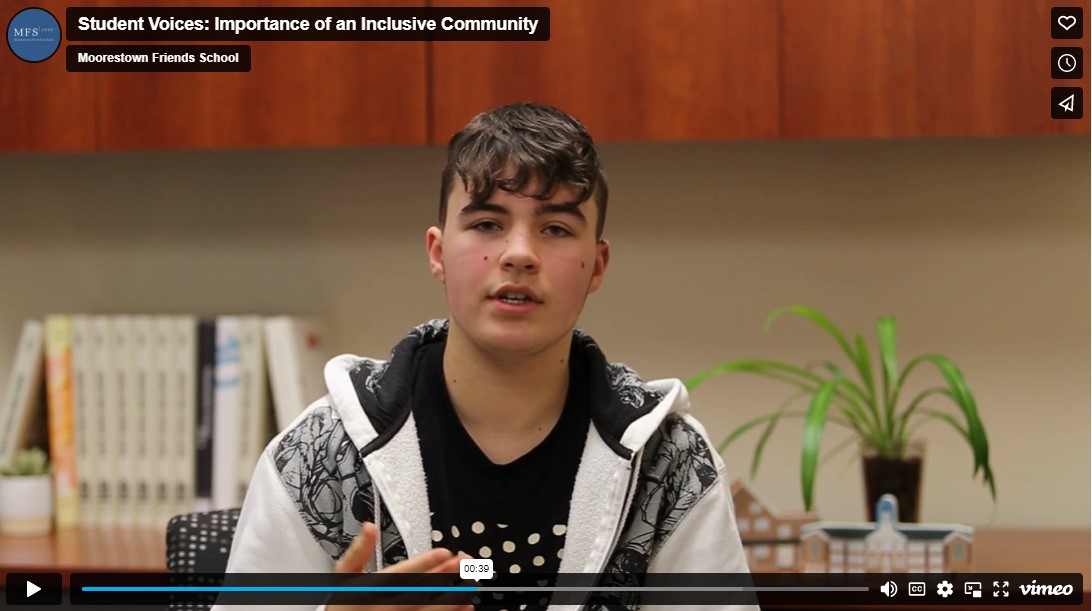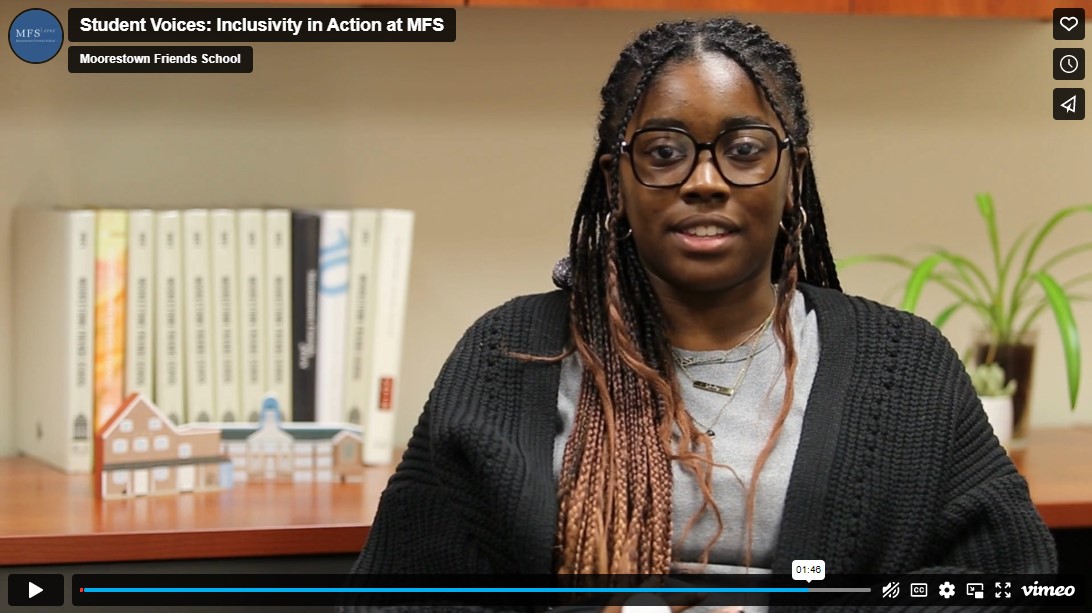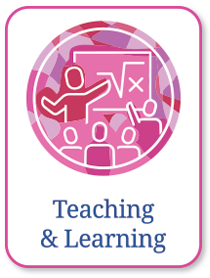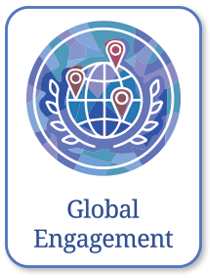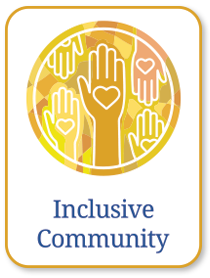
Inclusive Community
Moorestown Friends School values the Inner Light in all community members and provides students with opportunities to let their lives speak. Diversity alone is not enough and, curricularly and institutionally, choices must be made to create a truly inclusive community and one that works towards an equitable and just society for all. The MFS community has become steadily more diverse in recent years, including racial, religious, socio-economic, and gender and sexual diversity, among others. Demographically, many sending communities are also growing more diverse each year. In line with the school’s Quaker mission and values, MFS embraces diversity, celebrates all differences, encourages critical thinking, and engages in respectful discourse, allowing all community members to gain a deeper understanding of themselves and others. By providing an environment where students can bring their full selves to school, conditions can be created in which all students can thrive and feel a deep sense of belonging.
Guiding Queries
- How might we align our curriculum, culture, systems, campus, and institutional structures with our highest vision for inclusion and belonging?
- How might our community commit to and hold ourselves accountable to open-hearted dialogue and cultural understanding across differences?
- How could our campus facilities demonstrate our commitment to inclusion and belonging?
Vision
MFS students, faculty, and staff will not only be more diverse, but the curriculum, experiences, and institutional systems at the school will also emphasize a commitment to inclusion and belonging. We will work to eliminate barriers to full participation in the MFS experience and create conditions in which all community members can bring their full selves to school, thereby allowing them to thrive.
GOAL:
Further nurture a school culture that honors the diversity of our community and promotes an inclusive experience that is aligned with our Quaker mission and values.
Upcoming Initiatives:
- Ensure conflict resolution practices that emphasize Quaker values and perspective-taking
- Promote governance structures and board membership that reflect an institutional commitment to belonging
- Continue to implement improvements to the program based on community feedback from the climate and culture assessment
GOAL:
Develop the school’s capacity to assess and adjust our program, traditions, facilities, and systems through an equity lens.
Upcoming Initiatives:
- Host guest speakers for families and the general public to foster cultural competency
- Build an ADA-compliant path from lower to upper campus to create greater campus access
Inclusive Community Snapshot
MFS Champions Restorative Practices for a Caring and Empathetic Campus Community
Imagine a school community where forming positive relationships are at the heart of its culture, and conflicts are seen as opportunities for growth, rather than reasons for punishment. That’s the promise of restorative practices, a more inclusive approach that shifts the focus of conflict resolution from punishment to understanding and reconciliation. 
At its core, restorative practices are about creating opportunities for individuals to reflect on their actions, take responsibility, and repair harm. By fostering open dialogue and mutual respect, restorative practices can help students develop empathy and a strong sense of community among each other.
At Moorestown Friends School, restorative practices are strengthening the school’s caring and empathetic environment for students, faculty, and staff. MFS joins a growing list of schools adopting restorative practices, in addition to more traditional disciplinary actions that focus on punishment for misbehavior and breaking rules.
“Restorative practices are 80% proactive and 20% reactive,” said Middle School Director Evan Haine-Roberts. “It’s not just a tool for discipline or conflict; by using restorative practices in our daily interactions with faculty, students, and staff, we’re helping to build open and positive relationships that make addressing issues easier when they happen.”
Recent research indicates that schools using restorative practices can enhance academic achievement and reduce misbehavior, substance abuse, and mental health challenges, while at the same time fostering a positive school climate and benefiting students from diverse backgrounds.
The Benefits of Restorative Practices at School:
- Fosters Community, Inclusivity, and Belonging: Restorative practices focus on repairing harm and restoring relationships. Rather than isolating or punishing students, restorative approaches encourage open dialogue, helping students feel heard and valued. This can create a stronger sense of belonging and a more supportive environment, where all students feel accountable to each other.
- Encourages Accountability and Ownership of Actions: Unlike traditional punitive measures, participants are encouraged to reflect on the impact of their behaviors on others and work toward marking amends, which fosters a sense of responsibility to positively influence their decision-making in the future.
- Promotes Emotional Intelligence and Social-Emotional Growth: Restorative practices encourage participants to take responsibility for their actions, understand the perspectives of others, and develop empathy. These skills are essential for personal growth and can lead to more mature, emotionally intelligent individuals who are better equipped to handle challenges within and outside of school.
- Advocates for a Positive and Peaceful School Culture: Instead of reinforcing power imbalances or instilling fear through traditional discipline, restorative approaches empower participants to actively engage in making things right.
“Restorative practices in the classroom tie in very closely with the Quaker values and SPICES on which MFS is built,” said Director of Diversity, Community, and Belonging Chanelle Walker ’01. “Our daily work involves thinking about what it means to create a strong school culture that not only addresses the root cause of a problem, but also sees and respects each person as an individual, advocates for peace, seeks truth, and recognizes our place in a larger community.”
Proactive Community Circles
MFS introduced proactive community circles as a restorative practice in the 2023-24 school year to foster a safe, respectful space for students, teachers, and staff to share thoughts and feelings. These circles build trust, empathy, and stronger relationships, setting the stage for positive interactions. Using a talking piece or prompts, participants take turns speaking and listening, promoting honest dialogue.  Proactive circles begin with the advisory period in the Middle and Upper School, where they serve as the first step in building meaningful relationships and faculty comfort with leading them. As the year progresses, faculty are encouraged to find opportunities to incorporate circles throughout the day, whether for building community or managing conflict. These practices serve as both a tool for fostering connection and a strategy for addressing challenges in the classroom.
Proactive circles begin with the advisory period in the Middle and Upper School, where they serve as the first step in building meaningful relationships and faculty comfort with leading them. As the year progresses, faculty are encouraged to find opportunities to incorporate circles throughout the day, whether for building community or managing conflict. These practices serve as both a tool for fostering connection and a strategy for addressing challenges in the classroom.
In future years, MFS plans to continue building out circles with new types of activities, addressing topics like digital citizenship and current events. The school is also formally establishing that restorative conversations are the best practice final step in reflection upon and repairing relationships after a difficult situation.
By dedicating time for intentional connection, these circles not only create space for shared understanding, but also provide a framework for restorative practices when conflicts arise. Through these circles, students and faculty alike practice important values and skills that enable MFS to be a strong, empathetic, and engaged learning community.

